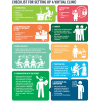Virtual Consultations and the Role of Technology During the COVID-19 Pandemic for People With Type 2 Diabetes: The UK Perspective
- PMID: 32716898
- PMCID: PMC7486671
- DOI: 10.2196/21609
Virtual Consultations and the Role of Technology During the COVID-19 Pandemic for People With Type 2 Diabetes: The UK Perspective
Abstract
The coronavirus disease (COVID-19) pandemic has presented unique challenges for people with diabetes, in addition to their high-risk stratification for infection. Supporting people with diabetes to self-care has been critical to reduce their risk of severe infection. This global pandemic has presented an opportunity to digitalize diabetes care and rapidly implement virtual diabetes clinics, with the aim of optimizing diabetes management and well-being, while keeping patients safe. We performed a rapid review of the literature to evaluate the feasibility and effectiveness of virtual clinics in diabetes care before and during the COVID-19 pandemic and have combined these findings with our own reflections in practice. We identified examples demonstrating safety and feasibility of virtual diabetes clinics, which aligns with our own clinical experience during the pandemic. The advantages of virtual clinics include reduced treatment burden, improved therapeutic alliances, societal and psychological benefits, and in our experience, innovative solutions to overcome the challenges presented by the transition from in-person to virtual care. We have provided three infographics to illustrate lessons learned and key recommendations, including steps to establish a virtual diabetes clinic, a checklist guide for health care professionals conducting virtual clinics, and a patient guide for making the most out of the virtual clinic. It is important to continue adapting to this pandemic and to make technology a sustainable option for the future of diabetes care.
Keywords: COVID-19; United Kingdom; diabetes; effective; feasibility; pandemic; technology; telehealth; virtual clinic.
©Lauren M Quinn, Melanie J Davies, Michelle Hadjiconstantinou. Originally published in the Journal of Medical Internet Research (http://www.jmir.org), 28.08.2020.
Conflict of interest statement
Conflicts of Interest: None declared.
Figures



References
-
- Novel Coronavirus – China. World Health Organization. 2020. [2020-07-19]. https://www.who.int/csr/don/12-january-2020-novel-coronavirus-china/en/
-
- Staying At Home And Away From Others (Social Distancing) Gov.UK. 2020. [2020-07-19]. https://www.gov.uk/government/publications/full-guidance-on-staying-at-h....
-
- Shenoy A, Ismaily M, Bajaj M. Diabetes and covid-19: a global health challenge. BMJ Open Diabetes Res Care. 2020 Apr;8(1):e001450. doi: 10.1136/bmjdrc-2020-001450. https://drc.bmj.com/cgi/pmidlookup?view=long&pmid=32345580 - DOI - PMC - PubMed
-
- Bornstein SR, Rubino F, Khunti K, Mingrone G, Hopkins D, Birkenfeld AL, Boehm B, Amiel S, Holt RI, Skyler JS, DeVries JH, Renard E, Eckel RH, Zimmet P, Alberti KG, Vidal J, Geloneze B, Chan JC, Ji L, Ludwig B. Practical recommendations for the management of diabetes in patients with COVID-19. The Lancet Diabetes & Endocrinology. 2020 Jun;8(6):546–550. doi: 10.1016/S2213-8587(20)30152-2. http://europepmc.org/abstract/MED/32334646 - DOI - PMC - PubMed
-
- Wu Z, McGoogan JM. Characteristics of and Important Lessons From the Coronavirus Disease 2019 (COVID-19) Outbreak in China: Summary of a Report of 72 314 Cases From the Chinese Center for Disease Control and Prevention. JAMA. 2020 Feb 24;323(13):1239–1242. doi: 10.1001/jama.2020.2648. - DOI - PubMed
MeSH terms
LinkOut - more resources
Full Text Sources
Medical

